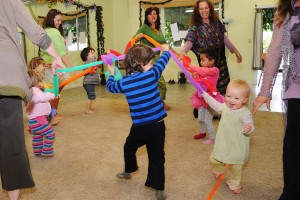Why is music such a great activity for my child?
These are just some of the reasons to get your child acquainted with music:
Language mastery: Music is a universal language, shared by people around the globe and through the ages. A brain that speaks the language of music has been observed to master spoken and written languages (including second languages) more easily than when music is not a native language.
Enhanced perception: Music training appears to increase auditory perception and discrimination, memory, spatial awareness, and mathematical reasoning.
Social and academic success: Music students are known for being more confident and more able to express themselves, getting better grades, working better in teams, and having greater academic success than their non-musically-trained peers.
Artistic awareness: Experiencing music in any form (listening, singing, playing, composing) increases awareness of what humans perceive as beautiful (or not). Shared perceptions of music create profound connections between people.
Since music is so beneficial, should we MAKE our child take music lessons?
In my opinion, no. If a child is forced to practice an instrument they don’t enjoy, this experience can lead to a lifetime of distaste for studying music.
That being said, I am confident that there are ways to encourage kids to be eager to take lessons.
One excellent way to whet your child’s musical appetite is to attend live concerts with them. When they see the connection between what the musicians are doing and the sounds they hear, the grid in their brain for understanding music is strengthened. They are often inspired to choose an instrument they want to play. You don’t have to pay a fortune for this: Almost every community has free concerts in the local park or schools, and talented local musicians can often be found performing around town. The next best thing to being at live concerts is watching recorded versions of the best concerts.
Another way to involve your child in music making from a young age is to attend group classes designed for early music education. Most communities have Kindermusik or Suzuki classes, and most preschools have music-and-movement classes, that teach the basics of music: keeping a steady beat, developing a well-tuned singing voice, and telling the difference between high / low and loud / soft.
When children are taught to listen and respond to music, these skills become part of them, so that they are comfortable with musical activity. Then, when they see that music is fun, they will want to learn more.
How do we choose an instrument for my child to study?
Perceptive parents are always on the lookout for activities that catch their child’s attention. I know a 3-year-old whose parents got him his own drum kit, because when he was still 2 years old, he showed precocious insight into how and when to make different sounds on a drum kit. An adult friend of the family who is a drummer discovered this budding talent when he was letting the little fellow “play” his drumset … and then realized that there was more than just playing around going on!
The moral of this story is: Find opportunities for your children to explore different instruments, and watch their reactions. Visit local music stores to try out different instruments, or ask your musical friends to stop by with their instruments so that your child can get their own (clean) hands on real instruments. Be alert to which instruments fascinate them, and find ways for them to pursue their interests. Encourage and support them, and see where it leads.
And dear parent, no matter how old you are, you can still take up an instrument yourself. Is there one you’ve always wanted to play? Maybe you and your child can take lessons together. This could be some of the most fun you’ve ever had!
What if my child loses interest in music lessons?
On the other hand, it does happen that kids THINK they really want to play a certain instrument, but when the realities of learning it sink in, interest can fade quickly. This can be an issue with parents who are investing a lot of time and attention, and are paying for an instrument, sheet music, transportation to lessons, and instructor’s fees.
I do think it’s fair to set positive, specific expectations with your child before investments are made, so that they learn what commitment and concentration and hard work mean. One approach is to put in writing what the expectations are in advance; some parents find it helpful to write up and sign contracts with their children. This is just one of the ways that music education can benefit your family: producing kids who can go the distance with their pursuits.
Other solutions to the “I don’t want to practice” dilemma: Find a teacher who better suits your child; try a different instrument; take a short-term break, and start back up in a week or a month; find a good buddy to share lessons and/or practice time with your child. Of course, if all else fails, take up a different hobby … but please don’t give up completely on getting your child involved with music!
Does it make sense to invest in music education if my child isn’t sure to become a successful professional musician?
It definitely is worth the investment. One of the main goals of music education is to teach an appreciation for what it takes to make music happen. When you’ve had your own fingers on an instrument trying to get the sounds just right, or when you’ve tried to write your own songs, there is a whole extra level of understanding of what is involved in the world of music.
Certainly not every music student will become a music professional, but they can all enjoy a lifelong love of music. Former music students often become music lovers who go on to support the arts in their community, making it possible for many others to enjoy great performances.

